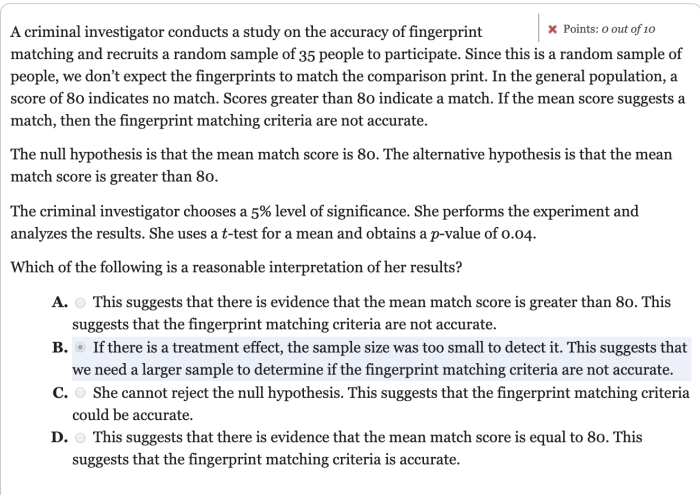Investigator a conducts research on emphysema – In the realm of respiratory medicine, Investigator A stands as a beacon of innovation, dedicating their research endeavors to unraveling the complexities of emphysema. Their groundbreaking work has shed new light on this debilitating condition, paving the way for advancements in diagnosis, treatment, and prevention.
Emphysema, a chronic lung disease characterized by the destruction of lung tissue, has long plagued individuals worldwide. Investigator A’s research has provided invaluable insights into the causes, symptoms, and progression of this disease, empowering healthcare professionals with a deeper understanding of its pathogenesis.
Emphysema Definition and Causes: Investigator A Conducts Research On Emphysema

Emphysema is a chronic respiratory disease characterized by the destruction of the alveoli, the tiny air sacs in the lungs that facilitate gas exchange. This damage leads to a loss of lung elasticity and impaired airflow, resulting in shortness of breath and other respiratory symptoms.
Primary Causes of Emphysema
- Smoking:The primary cause of emphysema is smoking, particularly cigarette smoking. The chemicals in cigarette smoke damage the delicate tissues of the lungs, leading to the destruction of alveoli.
- Air Pollution:Exposure to certain air pollutants, such as particulate matter and ozone, can also contribute to the development of emphysema. These pollutants irritate the lungs and damage the alveoli.
- Genetics:Some individuals have a genetic predisposition to emphysema. A deficiency in the enzyme alpha-1 antitrypsin (AAT) can lead to the destruction of alveoli and the development of emphysema.
Symptoms and Diagnosis of Emphysema
Common Symptoms
- Shortness of breath:This is the most common symptom of emphysema, especially during physical activity.
- Coughing:A chronic cough is another common symptom, which may produce clear or white mucus.
- Wheezing:A whistling sound during breathing can occur due to narrowed airways.
- Chest tightness:Individuals may experience a feeling of tightness or pressure in their chest.
- Fatigue:Emphysema can lead to decreased oxygen levels in the body, resulting in fatigue.
Diagnostic Tests
- Spirometry:This test measures lung function by assessing airflow and lung capacity.
- Chest X-rays:X-rays can reveal structural changes in the lungs, such as the destruction of alveoli.
- CT scans:Computed tomography scans provide more detailed images of the lungs and can help diagnose emphysema.
Importance of Early Diagnosis
Early diagnosis of emphysema is crucial for effective management. Early intervention can help slow the progression of the disease, reduce symptoms, and improve quality of life.
Treatment Options for Emphysema
Overview
Treatment for emphysema aims to manage symptoms, improve lung function, and prevent further damage to the lungs.
Medications
- Bronchodilators:These medications relax the muscles around the airways, making it easier to breathe.
- Inhaled corticosteroids:These medications reduce inflammation in the airways.
Oxygen Therapy
Supplemental oxygen therapy may be necessary for individuals with severe emphysema to increase oxygen levels in the blood.
Pulmonary Rehabilitation
Pulmonary rehabilitation programs include exercises, education, and counseling to help individuals with emphysema improve their breathing and overall health.
Surgical Interventions
In severe cases, surgical interventions such as lung volume reduction surgery or lung transplantation may be considered.
Prevention and Risk Factors of Emphysema

Primary Preventive Measure
Smoking cessation is the most effective way to prevent emphysema.
Modifiable Risk Factors
- Air pollution:Reducing exposure to air pollutants, such as particulate matter and ozone, can help lower the risk of emphysema.
- Occupational hazards:Individuals exposed to certain occupational hazards, such as dust and chemicals, may be at increased risk of emphysema.
Genetic Counseling
Individuals with a family history of emphysema may benefit from genetic counseling to assess their risk and take preventive measures.
Current Research and Advancements in Emphysema Management

Ongoing Research, Investigator a conducts research on emphysema
Ongoing research efforts focus on improving the diagnosis and treatment of emphysema.
Potential New Therapies
- Stem cell therapy:Researchers are exploring the use of stem cells to repair damaged lung tissue.
- Gene therapy:Gene therapy approaches aim to correct genetic defects that contribute to emphysema.
Technology in Management
Technology plays an increasing role in the management of emphysema.
- Telemedicine:Telemedicine allows healthcare providers to remotely monitor and manage patients with emphysema.
- Wearable devices:Wearable devices can track vital signs and provide real-time monitoring of patients with emphysema.
Common Queries
What are the primary causes of emphysema?
Smoking and air pollution are the leading causes of emphysema.
What are the common symptoms of emphysema?
Shortness of breath, coughing, and wheezing are common symptoms of emphysema.
How is emphysema diagnosed?
Emphysema is diagnosed through a combination of physical examination, spirometry, and chest X-rays.
What are the treatment options for emphysema?
Treatment options for emphysema include bronchodilators, inhaled corticosteroids, oxygen therapy, pulmonary rehabilitation, and surgical interventions.
What are the risk factors for emphysema?
Smoking, air pollution, and occupational hazards are the primary risk factors for emphysema.